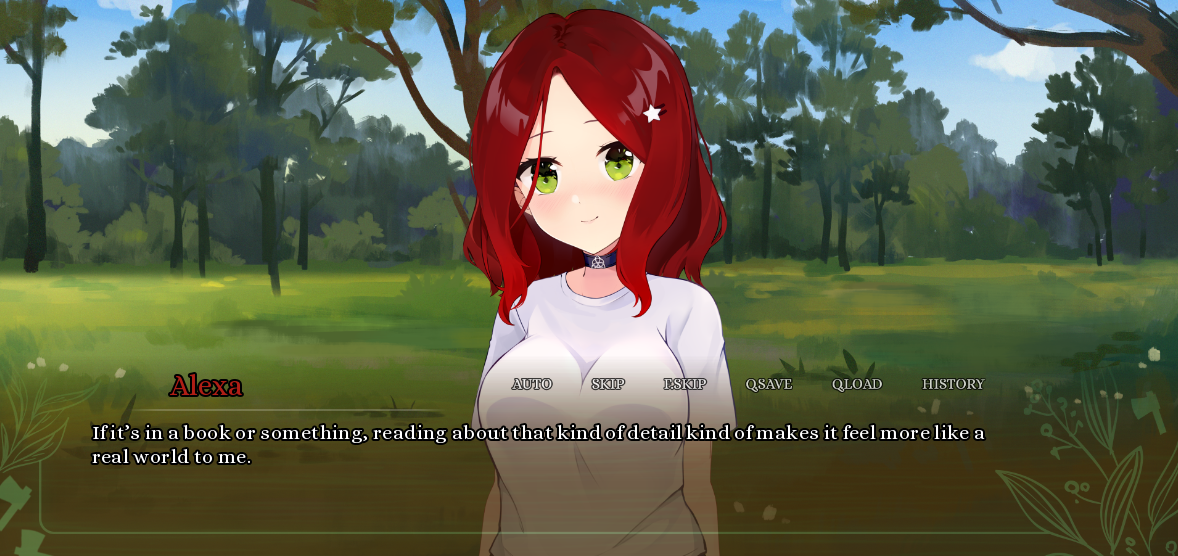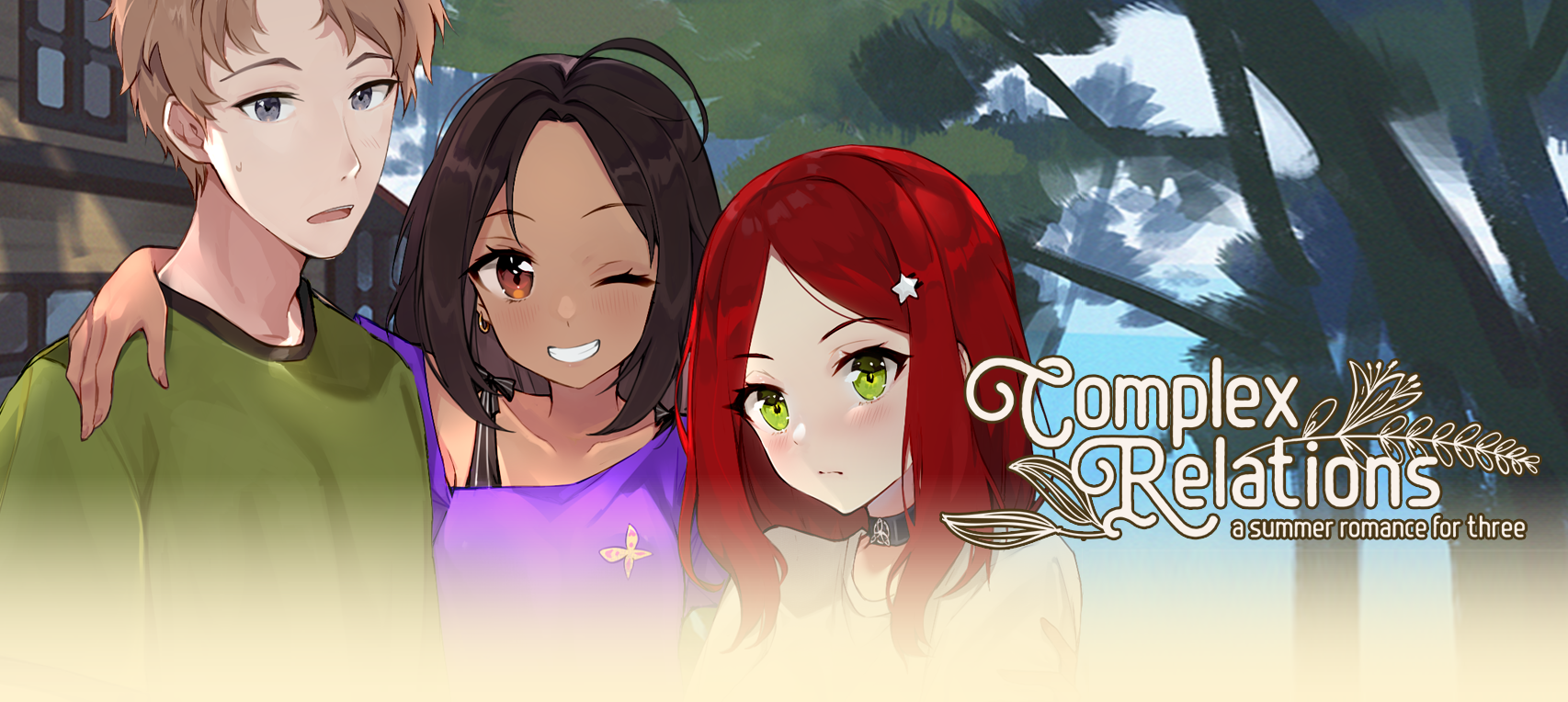Self-Insertion vs. Relatability
So, I should make clear to begin with that the subject I’m covering today is not an issue of objectively good vs. bad writing. This is a matter of personal preference for me, which influences the approach I’m taking with Complex Relations. But I also believe that this is a subject where many audience members have similar preferences, and some may not even have realized it due to a shortage of games which cater to them.
Here’s a question which goes back to the first devlog I wrote on character dynamics, one I think I can ask without it being too controversial. Why do so many romance-based visual novels star protagonists who’re bland and poorly defined? In many cases, this isn’t a failure of character writing, but a deliberate design feature. These characters are intended as player proxies for self-insertion, and developers fear that giving them standout character traits will detract from that purpose.
In practice, what this usually looks like is a character with no noteworthy hobbies, talents or opinions, who can go the entire duration of the game without ever having a conversation about any particular shared interests with any other characters. If they talk about activities which they take part in together with other characters, either the activities will be universally familiar to the audience, or the conversations will stay shallow enough that audience members who’ve never participated in the activity before won’t learn anything new about it.
The theory behind this is that avoiding giving the protagonist any uniquely characterizing traits, and sticking to universal activities and experiences, will make the protagonist more accessible to the audience. If the protagonist expressed an interest in some type of music audience members weren’t interested in, or some sport they don’t follow, or showcased some skill they don’t share, that difference might make the audience less able to relate to the protagonist.
The downside to
this is that it tends to result in protagonists who’re much more
boring than the average audience member. Most people, even totally
“average” people, have distinct interests, hobbies, skills,
strengths and weaknesses which give them points of connection with
other people. A character who’s scrubbed of these distinguishing
features will have less basis on which to relate to other characters
than a completely ordinary person would. This is a major reason why
so many visual novels feature character dynamics that involve a lot
of sitting around in awkward silence thinking about their feelings;
the characters don’t have anything to talk about.

Because most people
don’t share all possible interests, any particular thing a
protagonist is interested in is something that could set them apart
from much of the audience. But, almost everyone knows what it’s
like to be interested in things, or have some sort of skill or hobby
they’ve put time into. And this gives people a way to relate to
characters who’re invested in different things than themselves.
Maybe you spent time on a basketball team in school, and your
experience with that allows you to relate to a character who’s a
cross-country bicyclist. Maybe you have an interest in visual novels
which helps you connect to a character’s interest in fantasy
literature. Maybe you watch videos on medieval swords, and gives you
a sense of connection to a character who makes their own replicas,
even if you’ve never done anything like that yourself.
People can relate to other people in ways other than things they have directly in common. Not every possible point of connection will work for every audience member, but by giving a protagonist distinct features which they don’t share with every reader, that gives them ways to build stronger connections with other characters. And those stronger connections in turn are something else which audience members can relate to. After all, most people know what it’s like to have relationships which go beyond shallow connections. By making characters more distinct, it's possible to make them more, rather than less, relatable to the audience.
This is one of the reasons Complex Relations features three viewpoint protagonists. It’s a way of showcasing all the main characters as real people from each other’s perspectives. None of the characters are intended as strict audience inserts, but all of them are meant to be relatable in their own ways.
This is something I’d personally like to see more of anyway. Hopefully, Complex Relations will be able to reach audience members who feel the same.
Get Complex Relations
Complex Relations
A hot summer romance for three
| Status | In development |
| Author | Amai Works |
| Genre | Visual Novel |
| Tags | 2D, Anime, Coming Of Age, Erotic, relationship, Ren'Py, Romance |
| Languages | English |
More posts
- Complex Relations updated demo releaseApr 16, 2025
- Complex Relations currently live on Kickstarter!Dec 24, 2021
- Kickstarter Launch Date SetDec 15, 2021
- Variable sex scenesOct 02, 2021
- Back on track for launchSep 26, 2021
- Delay to Kickstarter LaunchJun 01, 2021
- Moving towards KS launchMay 10, 2021
- Writing SexMay 02, 2021
- Update: KS video now in developmentApr 15, 2021

Comments
Log in with itch.io to leave a comment.
Honestly, I cannot agree enough with this! Many devs seem to believe the existing insert-faceless-hentai-protagonist works well enough, but..it ultimately feels hollow.
There are a few VNs out there that give our player character a real personality and interests. When they do, it feels much more intriguing overall. An example would be Kaoru or "Producer-san" from Shining Song Starnova - this MC, apart from actually having eyes and a non-standard hair colour, has his own story filled with hobbies, dreams, regrets and very strong opinions!
This was my first experience with a VN protagonist that felt properly "alive" and fleshed out. The proof of concept being in essence: as long as you make your player character a relatively sane individual with a good heart, they can and will receive the audience relatability that the developers crave, regardless of their hobbies, interests, opinions and, within reason, appearance.